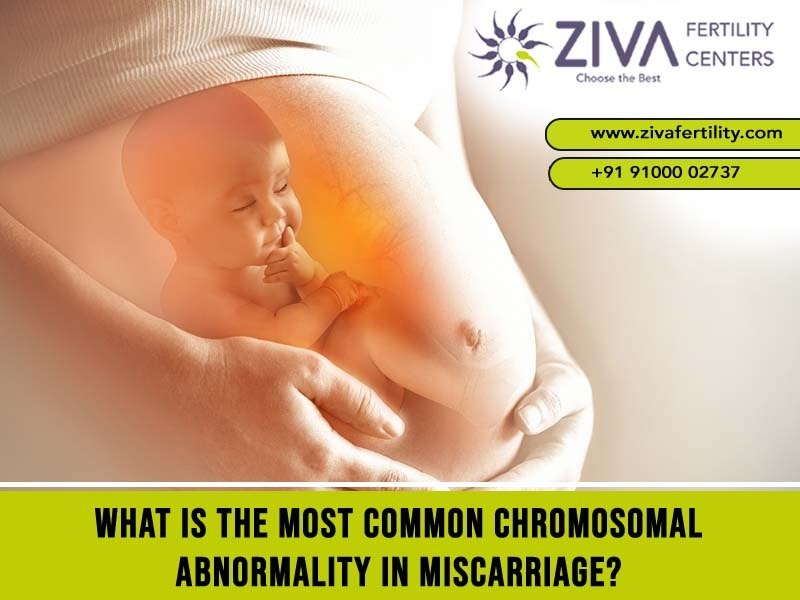Pregnancy is the most cherished moment in any couple’s life. Along with the couple, their families also dream of a healthy and happy child. But a miscarriage shatters those dreams, so it is essential to understand the causes of miscarriage and take the necessary steps for a smooth and blissful pregnancy. Out of the many causes of miscarriage, “Chromosomal abnormalities” are a common culprit. Let us understand, through this blog, why some chromosomal abnormalities lead to a miscarriage?
Pregnancy is the most cherished moment in any couple’s life. Along with the couple, their families also dream of a healthy and happy child. But a miscarriage shatters those dreams, so it is essential to understand the causes of miscarriage and take the necessary steps for a smooth and blissful pregnancy. Out of the many causes of miscarriage, “Chromosomal abnormalities” are a common culprit. Let us understand, through this blog, why some chromosomal abnormalities lead to a miscarriage?
innatgoosecreek.comreviewhttps://www.schmitz-galabau.de/tiefbaucopy watchesluxury replica watcheself bar strawberryhandyhulle selber machenkate spade phone case
Role of chromosomal abnormalities in miscarriage
Role of chromosomal abnormalities in miscarriage
Studies show that random genetic problems cause 50 and 70% of miscarriages in developing nations. Though the evidence is there, it cannot be explained by the scientists as to why chromosomal abnormalities lead to miscarriage. However, there are some potential theories such as:-
Studies show that random genetic problems cause 50 and 70% of miscarriages in developing nations. Though the evidence is there, it cannot be explained by the scientists as to why chromosomal abnormalities lead to miscarriage. However, there are some potential theories such as:-
- The immune system of the carrying mother detects an abnormality and terminates the pregnancy.
- The developing baby ultimately reaches a point where the underlying genetic issues stop the baby’s growth.
- If the growth-inducing genes are missing in the foetus, it leads to miscarriage.
- More than required copies of specific genes might cause the baby or placenta to grow improperly.
- Long term exposure to radiation, toxic chemicals may increase your risk of chromosomal abnormalities.
- The age of the parents also contributes to pregnancies affected by chromosomal abnormalities. If the mother is over the age of 35, this risk factor increases. Though it is not so specific about the male’s age, such abnormalities can occur over the age of 40.
The immune system of the carrying mother detects an abnormality and terminates the pregnancy.
The developing baby ultimately reaches a point where the underlying genetic issues stop the baby’s growth.
If the growth-inducing genes are missing in the foetus, it leads to miscarriage.
More than required copies of specific genes might cause the baby or placenta to grow improperly.
Long term exposure to radiation, toxic chemicals may increase your risk of chromosomal abnormalities.
The age of the parents also contributes to pregnancies affected by chromosomal abnormalities. If the mother is over the age of 35, this risk factor increases. Though it is not so specific about the male’s age, such abnormalities can occur over the age of 40.


Human cell division is a highly complex process, and many things can go wrong. The sperm or an egg cell may have an incorrect number of chromosomes or extra/missing chromosomes. Any of these reasons can ultimately cause miscarriage, stillbirth, or genetic disorders.
Human cell division is a highly complex process, and many things can go wrong. The sperm or an egg cell may have an incorrect number of chromosomes or extra/missing chromosomes. Any of these reasons can ultimately cause miscarriage, stillbirth, or genetic disorders.
Below are a few of the chromosomal abnormalities:-
Below are a few of the chromosomal abnormalities:-
- Trisomy 13- An additional chromosome characterises it. They have 47 chromosomes instead of 46, and it manifests as Down syndrome, Edward syndrome and Patau syndrome.
- Triploidy – In this rare chromosomal abnormality, the fetuses are born with an extra set of chromosomes in their cells.
- Monosomy – Instead of the usual two copies, there is only a single copy of a chromosome pair.
- Tetraploidy – It is an extremely rare chromosomal anomaly when an individual has four copies of each chromosome instead of two, resulting in a total of 92 chromosomes in each cell.
- Structural malformations include translocations where a segment from one chromosome is transferred to a new site on the same chromosome.
Trisomy 13- An additional chromosome characterises it. They have 47 chromosomes instead of 46, and it manifests as Down syndrome, Edward syndrome and Patau syndrome.
Triploidy – In this rare chromosomal abnormality, the fetuses are born with an extra set of chromosomes in their cells.
Monosomy – Instead of the usual two copies, there is only a single copy of a chromosome pair.
Tetraploidy – It is an extremely rare chromosomal anomaly when an individual has four copies of each chromosome instead of two, resulting in a total of 92 chromosomes in each cell.
Structural malformations include translocations where a segment from one chromosome is transferred to a new site on the same chromosome.
What to do after a miscarriage due to chromosomal abnormalities
What to do after a miscarriage due to chromosomal abnormalities
Women could still have further normal pregnancies if one pregnancy were affected by chromosomal abnormalities since chromosomal issues occur randomly. Recurrence of Chromosomal abnormalities is rare unless either one or both the parents have a similar genetic issue.
Women could still have further normal pregnancies if one pregnancy were affected by chromosomal abnormalities since chromosomal issues occur randomly. Recurrence of Chromosomal abnormalities is rare unless either one or both the parents have a similar genetic issue.


For chromosomal testing, a tissue sample from the miscarriage must be collected and analysed in a lab. But if it is a very early miscarriage, it is tricky to collect the sample, and it involves removing any tissue that didn’t pass during the miscarriage. Based on the count and the structure of the chromosome in the extracted tissue, one can confirm or rule out apparent abnormalities as the cause of a miscarriage.
For chromosomal testing, a tissue sample from the miscarriage must be collected and analysed in a lab. But if it is a very early miscarriage, it is tricky to collect the sample, and it involves removing any tissue that didn’t pass during the miscarriage. Based on the count and the structure of the chromosome in the extracted tissue, one can confirm or rule out apparent abnormalities as the cause of a miscarriage.
Treatment Options
Treatment Options
ZIVA clinics are leading fertility treating centres with years of experience. We have helping couples realise their dream of becoming parents, and we also deeply understand that pregnancy is an emotional journey. So if you are looking for any fertility-related consultations, reach us at +91-9100002737, +91-9392834024, Info@zivafertility.com.
ZIVA clinics are leading fertility treating centres with years of experience. We have helping couples realise their dream of becoming parents, and we also deeply understand that pregnancy is an emotional journey. So if you are looking for any fertility-related consultations, reach us at +91-9100002737, +91-9392834024, Info@zivafertility.com.
















